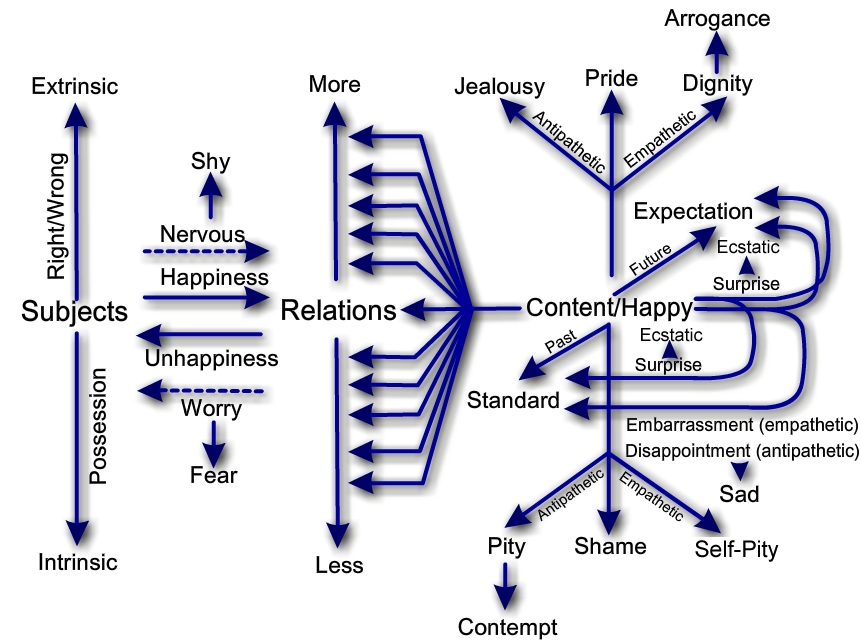1. Subject
⦁ Extrinsic Subject – subject encompassing a relation
⦁ Intrinsic Subject – subject comprising a relation
⦁ Right – if a subject is within an extrinsic subject
⦁ Wrong – if a subject is not within an extrinsic subject
⦁ Possession – if an intrinsic subject is within a subject
⦁ Good – what increases a relation
⦁ Bad – what hinders or decreases a relation
⦁ Serious – being within an extrinsic subject, also known as relevant
⦁ Confusion – if the choice of an extrinsic subject is ambiguous
⦁ Crazy – if an extrinsic subject is ambiguous
2. Happiness
⦁ Primary Happiness – if subjects combine and form a relation
⦁ Secondary Happiness – if subjects combine to an existing relation
⦁ Tertiary Happiness – back and forth between relations
⦁ Leverage Happiness – occurs when a related subject is lowered
⦁ Contentment – occurs at a relative position
3. Anxiety
⦁ Shy – extreme Nervousness
⦁ Nervous – anticipation of a combination
⦁ Worry – anticipation of a separation
⦁ Concern – mild Worry
⦁ Fear – extreme Worry
⦁ Terror – extreme Fear
4. Relative
⦁ Jealousy – antipathetic Pride
⦁ Envy – the action toward Jealousy
⦁ Pride – above Contentment
⦁ Dignity – empathetic Pride
⦁ Honor – the action toward Dignity
⦁ Arrogance – extreme Dignity
⦁ Pity – antipathetic Shame
⦁ Disgust – the action toward Pity
⦁ Shame – below Contentment
⦁ Self Pity – empathetic Shame
⦁ Humiliation – the action toward Self Pity
⦁ Contempt – extreme Pity
⦁ Modesty – at level with Contentment
⦁ Humility – the action toward Modesty
⦁ Respect – the action toward Pride
5. Assessment
⦁ Expectation – future Contentment
⦁ Standard – past Contentment
⦁ Surprise – empathetically or antipathetically above Standard or Expectation
⦁ Ecstatic – extreme Surprise
⦁ Embarrassment – empathetically below Standard or Expectation
⦁ Disappointment – antipathetically below Standard or Expectation
⦁ Sadness – extreme Disappointment or Embarrassment
6. Desire
⦁ Satisfaction – got what you wanted
⦁ Grief – didn’t get what you wanted
⦁ Distress – got what you didn’t want
⦁ Relief – didn’t get what you didn’t want
⦁ Frustration – not getting what you wanted
⦁ Anger – extreme Frustration
7. Etiquette
⦁ Sorry – empathetic Unhappiness
⦁ Regret – the action toward Sorry
⦁ Gratitude – the action toward antipathetic Happiness
⦁ Forgive – declaring Unhappiness to be irrelevant
⦁ Blame – declaring Unhappiness to be relevant
⦁ Admiration – the action toward Respect
8. Love and Hate
⦁ Love – extreme empathy
⦁ Hate – extreme antipathy
Axioms
⦁ The Authority Rule – Extrinsic subjects can never be related intrinsic subjects. Such an event would instantly cause a new extrinsic subject to exist.
⦁ The Base Rule – Related subjects do not combine for the same reason that unrelated subjects do not separate.
Statements
⦁ Procedures are relations in time.
⦁ Games are competitions for secondary happiness.
⦁ There are only three options: empaty, apathy and antipathy.
⦁ Related subjects are antipathetic to each other but empathetic to each other in the presence of other relations.
⦁ All emotions occur after an event with the exception of the anxiety emotions.
⦁ There are two things to know about leverage happiness: it only works if the subjects are related and it flirts with hate.
Difficulties
⦁ Pity is normally associated with sympathy – but not always.
⦁ Nervous is sometimes interchanged with worry.
⦁ The action emotions are not normal actions. They are emotional actions. They do not exist in time or space.

